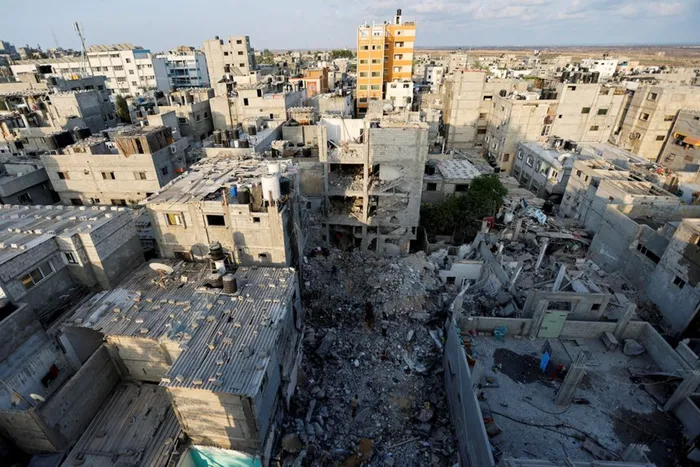Siege of Gaza: Will Suhaila's plea fall on deaf ears?

Picture: Said Khatib AFP – A Palestinian youth salvages a toy from the rubble of his house which was destroyed during the latest three days of conflict with Israel ahead of a truce, in Rafah town in the southern Gaza Strip, on August 8, 2022.
By Iqbal Jassat
The illusion created by Israel that since it evacuated troops and settlers from the Gaza Strip it no longer controls the territory, was shattered once again.
Sadly, the circumstances illustrating that Israel maintains an iron grip over the Gaza Strip, has been tragic for the al-Masri family, who lost their 20-month-old baby due to it.

Their heartbreaking tale was heard in Geneva when Suhaila al-Masri, the grandmother of baby Fatima, recounted the intransigence of Israel as the cause of Fatima's untimely death.
Addressing the United Nations Human Rights Council (UNHRC) via link, al-Masri said that the UNHRC and its member states had an obligation to pressure Israel to end the suffocation of Gaza. She said medical patients face painful deaths due to Israel depriving besieged people of Gaza their right to movement and treatment.
Explaining the tragedy faced by her granddaughter Fatima, she stated that Israeli authorities left her to suffocate slowly by stalling the issuance of an exit permit to receive treatment abroad, which eventually caused the toddler’s death last March.
Fatima was born after eight years of fertility treatments, explained al-Masri, but died a year and eight months later due to Israeli authorities’ refusal to approve her exit permit to receive treatment in Jerusalem.
Fatima suffered from “a hole in her heart that required immediate treatment” — treatment that was unavailable in the Gaza Strip. The al-Masri family confirmed they had completed all of the medical and administrative procedures necessary to transfer Fatima to a Jerusalem hospital.
Suhaila al-Masri's submission facilitated by Euro-Med Human Rights Monitor, recalled that despite five consecutive requests for an exit permit, each one was denied by the occupying power.
A press statement issued by Euro-Med reveals that al-Masri asked the UNHRC what kind of security risk her granddaughter might have posed had she been allowed into Israel for treatment, emphasising the case “did not require all of [the] procedures and security checks and time spent waiting for permission” that ultimately led to the child’s death.
She pointed to Fatima as one of “dozens who died as a result of Israel’s policy of delaying exit permits for Gaza patients” as part of Israel’s collective punishment policy against Gaza Strip residents since the imposition of the blockade in 2006.
Since the beginning of this year, five Gaza patients, including three children, have died as a result of Israeli authorities’ delays in approving exit permits for treatment.
A fact well known to the international community as well as UN institutions including the Security Council, is that the Gaza Strip is a 365-square-kilometre territory under Israeli control since 1967. Over 2 million Palestinians live in the densely populated territory.

Since the blockade was imposed on it 15 years ago, Israel has full control over its airspace, territorial waters and border crossings. Though Egypt controls the Rafah border crossing, it operates under instructions from Israel, remaining sealed most of the time.
Described as the world's largest open air prison, the siege of Gaza by Israel is directly responsible for the extreme humanitarian crisis faced by the population.
Grim statistics compiled by various humanitarian organisations tell a dire story of life in Gaza today:
* around two-thirds of the Palestinian population of Gaza are refugees, forcibly displaced from their lands and homes in Palestine in 1948 by Israel;
* over 500,000 live in eight refugee camps across the Gaza Strip, in some of the highest population densities in the world;
* 97 percent of Gaza’s water is undrinkable and contaminated water results in poisoning people;
* electricity supply is dependent on Israel as the occupying power and subject to massive power cuts;
* starved of power, healthcare services are in perpetual crisis, impacting on vital lifesaving equipment, healthcare workers and essential medicines;
* patients needing external specialist care are routinely denied permission by Israel to leave Gaza as highlighted by Suhaila al-Masri;
* unemployment is rife due to the siege;
* tens of thousands are displaced within Gaza due to Israel’s relentless bombardments and destruction of their homes.
While the UN and many member states including South Africa acknowledge that the siege and blockade of Gaza through the land, air and sea, is a denial of fundamental human rights in contravention of international law and amounts to collective punishment, Israel remains unmoved, untouched and defiant.
The tragedy that befell the al-Masri family is symptomatic of collective punishment endured by Gaza’s population.
Jassat is an executive member of the Media Review Network Johannesburg, South Africa.
This article is original to the The African. To republish, see terms and conditions.